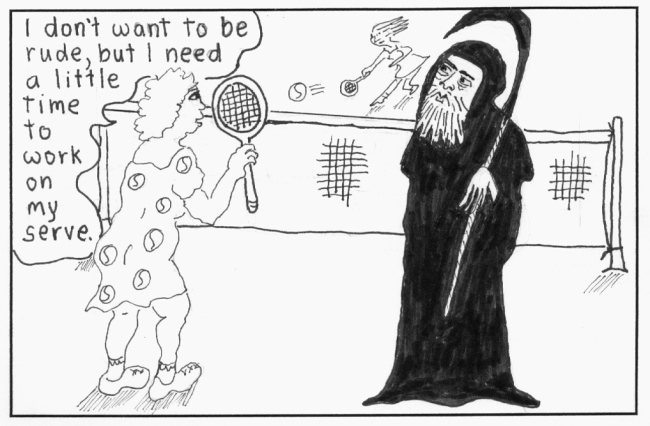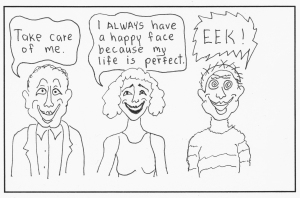A Perfectionist talks to Death, from “The Enneagram of Death.”
Four years after his father died, author and psychiatrist Mark Epstein’s mother told him she was still upset. This conversation pleased him because, he said, “grief needs to be talked about. When it is held too privately it tends to eat away at its own support.”
Epstein says in “The Trauma of Being Alive,” (New York Times 8-4-13), “Trauma isn’t just the result of major disasters. It does not happen to only some people. An undercurrent of it runs through ordinary life, shot through as it is with the poignancy of impermanence… If we are not suffering from post-traumatic stress disorder, we are suffering from pre-traumatic stress disorder. There is no way to be alive without being conscious of the potential for disaster. One way or another, death (and its cousins: old age, illness, accidents, separation and loss) hangs over all of us… “
Trauma was also a theme of the panel of 9 people mostly in their 30’s I had assembled to talk about death, fear, and grief at the 2013 International Enneagram Conference last August.
Earl, the 1-Perfectionist, was concerned about his need to leave the world better than he found it. “I’ve always had this sense of mission and zeal. I want to have an impact. In the background I desire to make improvements and bring forth a new perspective. My fullest form of self-expression is to change things. I don’t want my mission to be cut short. Death is the point that, whatever you’ve done by then, you’re done.
“My own death seems like a zen or transition point, but physical and mental decline scare me. Back in my 20s I was depressed and felt a disconnect between the way I wanted to live and the way I was. It’s painful to think about losing my mobility, my capacity to enjoy activities. I hope to think rationally, have a clear sense of judgment, and see things how they are. Realizing how much we regret decisions we’ve made and fear living with the consequences are big fears for Ones in general. This sheds light on death itself. You die and there’s nobody there and no more regret. A lot of times when I’m anxious about something I can’t control (job security), I’ll get tunnel vision and concentrate on what I CAN control. Like the 6-Questioner, I’ll ruminate, think, and keep busy.”
Linda, the 2-Helper, said “I relate to the 6-Questioner’s mental anxiety. I make up that my husband will die and I’ll be alone. I am the one with health issues, but the habit of the Helper is to focus on the other. He eats a lot of Snickers so I’m always criticizing his diet in my head. I go on rants about nutrition and how we’re killing ourselves with toxins. I’m a health nut because I have rheumatoid arthritis—I’m the one who has had to change my diet.
“When I was 9 years old a horse kicked me in the head. I went to a beautiful place where there was no separation. There was no light but it wasn’t dark. No pain. Peaceful. Infinite. I can’t imagine anything more amazing. My whole life has been about getting back there. There’s nothing to fear. We have moments of heart connections where there’s no separation. The thought of dying is a comfort. I think about it a lot and look forward to it.”
See Part II (types 3, 4, and 5) on Oct. 8.
Look for my blog about healing PSTD in Psychology Today Oct. 1.
Visit “Are You My Type, Am I Yours?” on FB and check out my work on wagele.com.

